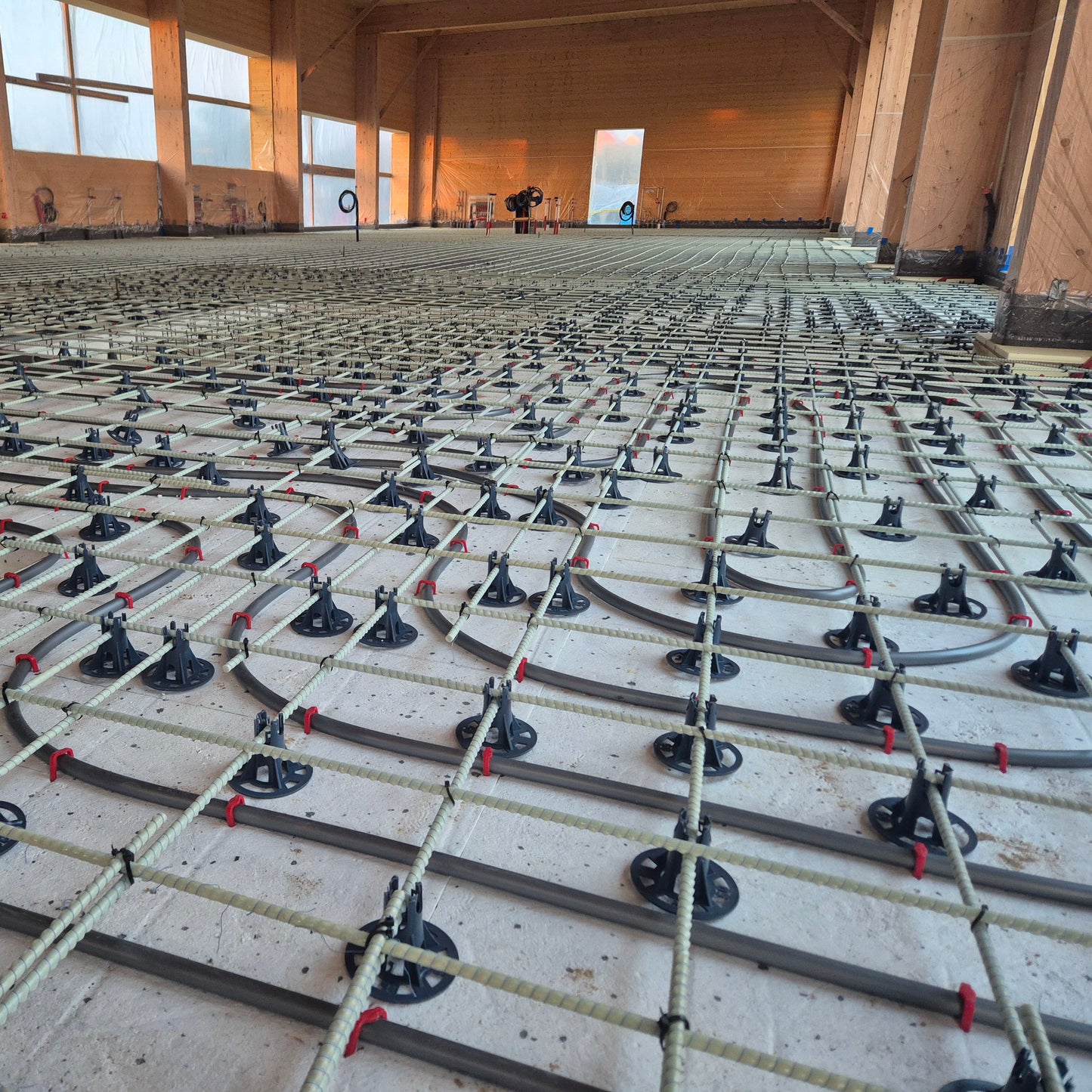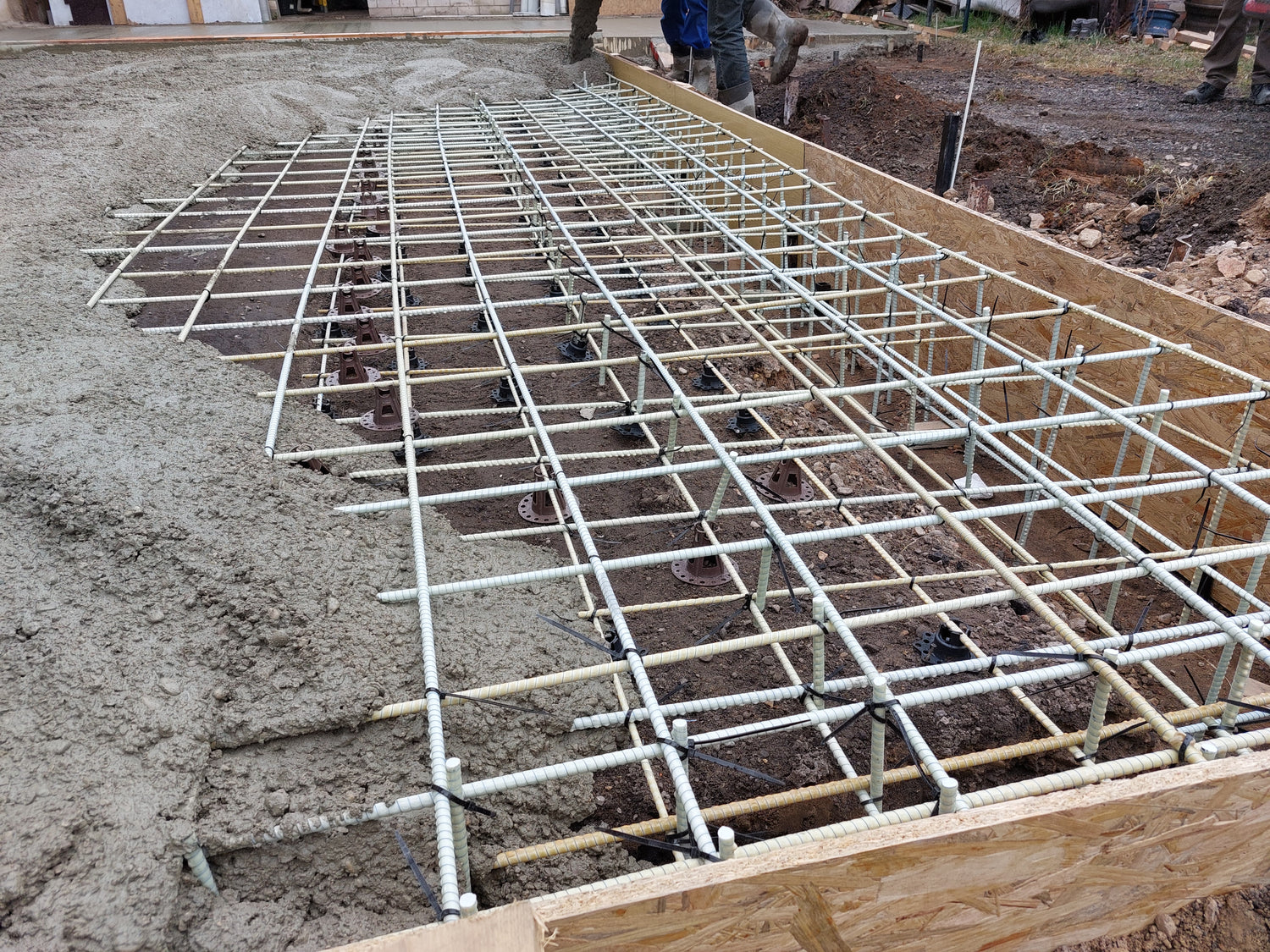Ugira LT
Fiberglass rebar
Fiberglass rebar
Couldn't load pickup availability
Fiberglass rebar is especially suitable for reinforcing elements that will be exposed to aggressive media (reservoirs, canals, farm floors and gutters, car roads and parking lots, fertilizer warehouses, etc.). In such elements, it solves the weakest side of steel - that is, resistance to corrosion.
WHAT IS IT?
WHAT IS IT?
Fiberglass reinforced polymer rebar (also known as
composite reinforcement (rebar), fiberglass reinforcement (rebar)) - a great
choice for reinforcing foundations and concrete floors. It is suitable for
reinforcing concrete elements, especially those intended to be operated in
aggressive environments.
Composition
- High quality Vinylester (epoxy bisphenol A vinyl ester) resin made in Europe.
- ECR (Electrical, Chemical, and Corrosion Resistant glass) fiberglass.
- Pigment.
- Hardeners and other additives required for the production process.
The use of these components ensures high mechanical characteristics and high resistance to aggressive environments. both alkaline and acidic. Fiberglass reinforcement is not additionally stabilized against UV radiation, so it is not suitable for long-term use outdoors.
Use
Reinforcement in monolithic elements is used mainly to absorb tensile and compressive stresses. Fiberglass reinforcement "works" poorly in compression, so it is mainly used in elements to absorb tensile stresses and form transverse reinforcement. Reinforcement bars (both steel and composite) are in no way counted as bending elements. They are evaluated only as a component of a reinforced concrete element, which performs partial absorption of tensile or compressive stresses, especially tensile, since concrete is much more resistant to compression than to tension.
PROS AND CONS
PROS AND CONS
Pros:
- Tensile strength 750-1020 MPa, it depends on the diameter of the rod and is 1.5 to 2 times higher than S500 grade steel.
- Density about 2000 kg/m3, it is about 3.9 times lighter than steel reinforcement.
- It deforms only elastically, so it can be rolled into coils and straightens out when released, without remaining bent.
- Due to its relatively low weight and the ability to roll into coils, it is convenient to transport, carry and reduces the amount of residue.
- Thermal conductivity coefficient about 0.34 W/(mK) (about 130 times less thermally conductive than steel).
Non-conductive to electric current and completely transparent to magnetic and electromagnetic fields.
Cons:
- The modulus of elasticity is 35-45 GPa (also depends on the diameter and is about 6-4.6 times lower than steel).
- Operating temperature up to 105 °C (steel characteristics begin to decrease from 300 °C).
- Fiberglass (regardless of its binder) have a property of fatigue. Therefore, the continuous load should not exceed 50-60% of its maximum bearing capacity.
RECOMMENDATIONS
RECOMMENDATIONS
Basic recommendations for the use of
fiberglass reinforcement:
- Particularly suitable for reinforcing elements that will be exposed to aggressive media (reservoirs, quay structures, canals, farm floors and gutters, car roads and parking lots, fertilizer warehouses, etc.). In such elements, it solves the biggest disadvantage of steel reinforcement - which is poor corrosion resistance.
- Very suitable for forming connecting reinforcement of multilayer partitions in order to break cold bridges and reduce thermal losses of the structure.
- Particularly suitable for structures that require magnetic or electromagnetic transparency (electrical network switchboards, magnetic resonance rooms, etc.).
- Suitable for elements that do not have highly concentrated stresses, as well as elements that will be operated in a humid environment or in an aggressive environment (foundations, floors, retaining walls, plinth slabs, etc.)
- For structural frame elements (columns, beams, floor slabs, etc.) it can only be used after the structures have been recalculated by a responsible qualified designer. Due to the significantly lower modulus of elasticity, the deformations of fiberglass reinforcement compared to steel will be about 4.6-6 times greater under the same load, so it is necessary to assess this and increase the total cross-sectional area of the reinforcement bars accordingly. In general, it is irrational to use fiberglass reinforcement in such elements unless there are very good reasons why steel reinforcement is unsuitable for use (due to the necessary magnetic transparency or corrosion requirements).
- Due to fatigue, it cannot be used for prestressed reinforced concrete structures.
PACKAGING
PACKAGING
Fiberglass rebar is rolled into coils with a diameter of 1.2-1.7 m depending on the diameter of the rebar.
If you are interested in rebar cut to your desired lengths, contact us in a convenient way for you. Look for our contacts in the
"Contacts" section :)
NOTES
NOTES
- Fiberglass rebar is not additionally stabilized against UV radiation, so it is not suitable for long-term use outdoors.
- When the product is unrolled from the coil, the rebar may have a slight bend and may be not completely straight.
- If you are interested in fiberglass posts for electric fencing, see here https://ugira.com/products/copy-of-stiklo-pluosto-kuoleliai
- The real color of the goods may differ from the goods depicted in the photo.
DELIVERY
DELIVERY
Orders are delivered using DPD courier services.
Delivery time: 2-5 working days from the order payment.
It is possible to pick up the order at: Varpo str. 43, Šunskai, Marijampolė
mun.
Share












Rebar technical characteristics
|
Performance |
Unit |
Value |
|||||
|
Φ4 |
Φ6 |
Φ8 |
Φ10 |
Φ12 |
Φ16 |
||
|
Nominal diameter |
mm |
4 ± 0,5 |
6 ± 0,5 |
8 ± 0,5 |
10 ± 0,5 |
12 ± 0,5 |
16 ± 0,5 |
|
Max diameter |
mm |
4,5 ± 0,5 |
7 ± 0,5 |
9 ± 0,5 |
11 ± 0,5 |
13,5 ± 0,5 |
17,7 ± 0,5 |
|
Min diameter |
mm |
3,5 ± 0,5 |
5 ± 0,5 |
7 ± 0,5 |
9 ± 0,5 |
11 ± 0,5 |
15 ± 0,5 |
|
Calculated cross-sectional area |
mm2 |
12,56 |
28,26 |
50,24 |
78,5 |
113,04 |
200,96 |
|
Weight of 1 meter |
g |
24 ± 5% |
47 ± 5% |
95 ± 5% |
145 ± 5% |
205± 5% |
405 ± 5% |
|
Min tensile strength * |
MPa |
≥ 950,26 |
≥ 1022,59 |
≥ 1049,99 |
≥ 1097,12 |
≥ 1005,75 |
≥ 909,98 |
|
Modulus of elasticity in tension |
GPa |
≥ 44,95 |
≥ 45,17 |
≥ 46,70 |
≥ 51,76 |
≥ 47,71 |
≥ 45,37 |
|
Compression strength |
MPa |
≥ 300 |
|||||
|
Tensile strength, shear |
MPa |
≥ 150 |
|||||
|
Elongation at break |
% |
≤ 2,34 |
≤ 2,46 |
≤ 2,40 |
≤ 2,15 |
≤ 2,32 |
≤ 2,01 |
|
Operating temperature |
0C |
≤ 70 |
|||||

Corrosion resistance
Especially suitable for reinforcing elements exposed to a harsh environment.












